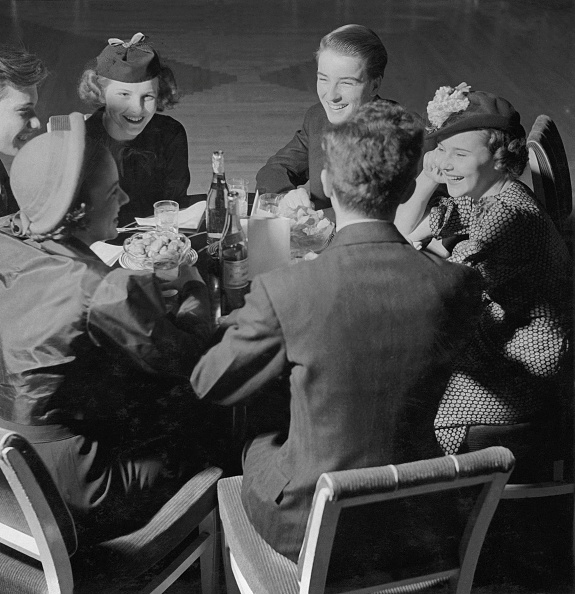
Editor’s note: The following excerpt — “How to Acquire Good Manners” by Bentley Bates — was included in The Boy’s Own Book of Leadership, published in 1933.
Life is not so short but what there is always time for courtesy. –Ralph Waldo Emerson
Good manners like all other human accomplishments may be acquired by any boy if he will study himself, imitate the best models and then practice – practice. Make a little chart of your good qualities and determine to make them better. It is often easier to crowd out bad manners by good than to deliberately “pull the weeds.†Then make a list of your unfortunate qualities and set about neutralizing them by striving for their opposites. For instance, if you are selfish, study to become unselfish. If you are loud and noisy, study to be quiet. If you are critical and unfriendly, study to be generous in your praise. If you are pessimistic and blue — whistle, smile, tell good stories, find something good and beautiful in somebody every day. Every new good manner that you so develop is an achievement.
Deliberately associate with folks that have the sort of manners you wish to acquire – remember they are contagious, and when you see others that have actually achieved desirable manners, you are encouraged to believe that you, too, may have those qualities. As Lord Chesterfield suggests:
Imitate with discernment and judgment the real perfections of the good company into which you may get; copy their politeness, their carriage, their address, and the easy and well-bred turn of their conversation; but remember that, let them shine ever so bright, their vices, if they have any, are so many spots, which you would no more imitate than you would make an artificial wart upon your face, because some very handsome man had the misfortune to have a natural one upon his; but, on the contrary, think how much handsomer he would have been without it.
Constantly seek to increase your bank account of pleasing manners so that, no matter what the occasion, you can “check on it†to any extent without embarrassment. Somebody once said that Napoleon never had any manners until he was too great to need them. This is a wrong idea. Really great and forceful men are invariably men of refined manners. If you doubt it, read the lives of the world’s best, and you will easily be convinced of the great place of manners in the lives of these men, for while they each achieved fame and greatness in some special line, nevertheless they achieved greatness in the Fine Arts of Living Together.
Lord Chesterfield, in writing to his son, said:
However trifling a genteel manner may sound, it is of very great consequence towards pleasing in private life, especially the women, whom, one time and another, you will think worth pleasing; and I have known many a man from his awkwardness give people such a dislike of him at first, that all his merit could not get the better of it afterward. Whereas, a genteel manner prepossesses people in your favor, bends them towards you, and makes them wish to like you. Awkwardness can proceed from two causes: either from not having kept good company, or from not having attended to it.
Following are a few points on good manners, which are worth any boy’s time to master. “To Be Prepared,†in this connection, is as always good advice.
- Do not stand with your hands in your pockets.
- Never pick your teeth or clean or cut your fingernails in public.
- Do not breathe through your mouth or talk through your nose.
- Never listen with your mouth open.
- Do not show ill temper when you lose at a game.
- Do not interrupt in conversation.
- Do not be witty at the expense of others; there is plenty of fun that is funny for everyone.
- Never be sarcastic or ridicule one another.
- Do not talk too loud.
- Do not be snappish if you are teased.
- Cultivate good table manners.
- Do not touch a lady’s arm when you wish to speak to her.
- Never be late to any function. Your being late may delay your hostess, and it makes it appear that you were indifferent about accepting her invitation.
- When invited to a dinner, a reception, or any other party, word your answer formally or informally to correspond with the invitation, and include in your reply all who were mentioned in the invitation.
- Acknowledge every invitation as promptly as possible, so that the hostess may ask someone else if you decline, or may ask someone especially for your pleasure, if you accept.
- If you take a lady to a dinner, or to a reception, wait either outside your dressing-room door or at the head of the stairway, so that you can see when she is ready to go down.
- Always be ready before the lady you are to escort can possibly be ready, and never grumble if she keeps you waiting. If she is inconsiderate, avoid whenever possible future engagements with her.
- If you are invited to a party given in honor of a special guest, make your call, if possible, before the guest leaves.
- When you are invited to dine, or when you receive any other special courtesy, reciprocate by some invitation of your own as soon as you can.
- Never take your watch out during a call, and above all, do not try to get a surreptitious look at it. Leave whenever you wish to go, but do not look at your watch.
- Always introduce men to women, young men to older or to more distinguished men, young women to older women – never the reverse.
- Always be a gentleman.


